Babbel vs Rosetta Stone – Two Titans in Language Learning
Babbel and Rosetta Stone are two of the most popular language-learning apps in the world. Most people learning a new language have come across these two programs early on in their search for the course they want to use.
The quickest way to describe the similarities and differences between these two platforms would be…
- Babbel is a little cheaper and includes explanations and translations in English whereas Rosetta Stone uses your target language almost exclusively. Babbel teaches using longer dialogues and Rosetta Stone uses more individual sentences.
- Both platforms have well-structured lessons that build on each other but can get too repetitive. The voice recognition software for both is only okay and not too reliable. They teach several different languages but aren’t the best for learning about different cultures.
Of the two platforms, Babbel makes a better choice for a beginning language learner.
That said, many other online and app-based language learning platforms offer much more than either of these options.
To see all of our favorite programs, online subscriptions, apps, podcasts, and YouTubes for the language you’re learning, look for your language in the table below.
To see all of our favorite programs, online subscriptions, apps, podcasts and YouTubes for the language you’re learning, look for your language in the table below.
MOST RECOMMENDED RESOURCES BY LANGUAGE
Advantages of Babbel and Rosetta Stone
Babbel
- Grammar is explained clearly with lots of examples.
- Babbel uses conversational language that you’re likely to use in real life.
- There is a decent variety of exercise types.
- The platform features high-quality audio.
- It offers a nice layout and design.
Rosetta Stone
- The immersive approach with zero English translations can make it easier to translate less in your head as you go along.
- The platform features high-quality audio.
- It uses a highly visual approach with a nice layout and design.
Disadvantages of Babbel and Rosetta Stone
Babbel
- The voice recognition software can cause frustration because it does not always recognize what you say.
- The repetitive exercises aren’t very unique.
- You’ll need to use other resources alongside Babbel to get conversation practice.
Rosetta Stone
- The repetitive exercises revolve around matching pictures to words, making it more monotonous than most other platforms.
- It’s more expensive than most alternatives.
- Trying to convey all the information from images alone can lead to unnecessary confusion when a simple explanation in English would work much better. You will likely find it quite hard to learn grammar from Rosetta Stone.
- It’s not going to get you speaking fluently as fast as some other platforms.
Languages Available
Rosetta Stone has courses available in 25 languages and Babbel has courses in 14 languages.
Babbel offers a course in German, Spanish, French, Italian, Portuguese, Swedish, Turkish, Dutch, Polish, Indonesian, Russian, Danish, Norwegian, and English.
For Rosetta Stone, the languages available can be found in the image below:

Cost
With Babbel, you can subscribe either with a one-month plan for $12.95, a three-month plan for $26.85, six months for $44.70, or a yearly subscription for $83.40.
A subscription to Rosetta Stone costs $35.97 for three months with access to one language, $179 for 12 months and access to all languages, or $199 for lifetime access to all Rosetta Stone language courses.
Depending on the level of subscription you choose, Babbel typically costs less than Rosetta Stone.
How languages are taught on each platform
Babbel
Babbel’s lessons provide a decent foundation for a beginner but they’re far from unique. Most of these lesson topics can also be found within other language learning platforms.
The lessons start with a speaker reading the important words you’ll need to learn, each word paired with an image.
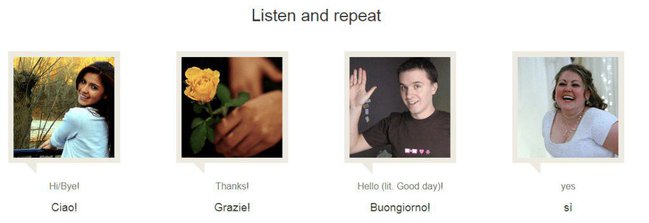
After that, you’ll listen to and repeat the words using their voice recognition software which then gives you a grade based on how accurate your pronunciation was. It’s nice that it encourages you to get speaking aloud, but the technology isn’t good enough that you can trust it on its own to know if your pronunciation is alright.
To get good feedback on your speaking, I’d recommend finding a tutor on italki – it’s often less than $10/hr. For a free option, check out the conversation app HelloTalk.
From there, you’ll match the translations to the pictures. Next, you’ll write the translation that corresponds to each image using the mixed up letters you’re given.
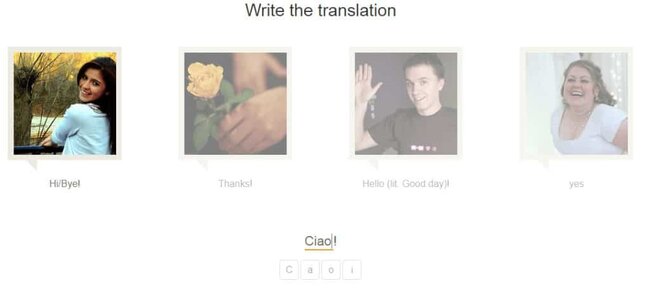
These aren’t terribly exciting exercises, but the repetition is helpful.
Following this, the words come together to form sentences and finally a dialogue. You’ll fill in the blanks with the correct word to complete the sentence. This is pretty simple since you’re given the mixed up letters.
The dialogues are very natural and are the type of conversation you would actually have in real life. The quality of the audio is also quite good and it’s spoken clearly.
You’ll also find grammar lessons that clearly explain things here with pop-up notes to explain some key points. I think this is a major advantage over Rosetta Stone. Grammar may not be the most exciting thing, but learning it can make things so much easier.
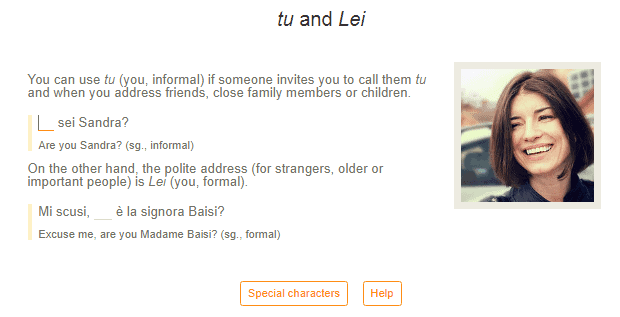
There are also review exercises after every couple of lessons.
Babbel’s strength is not innovation. Instead, it excels in providing well-structured courses, clear explanations, and a variety of ways to practice the content.
Read our full review of Babbel.
Rosetta Stone
Babbel’s lessons aren’t the most exciting or varied, but Rosetta Stone’s are even less so.
The key factor that makes Rosetta Stone different than other language-learning courses is that Rosetta Stone uses your target language almost exclusively. Their philosophy is that young children learn languages from immersion and that you should as well.
While immersing yourself in the sounds of a language can definitely speed up your learning progress, you may find it tough to learn about things like sentence structure without any lessons or explanations.
This is especially true for languages that do not share linguistic roots with English, like Japanese. Japanese uses a different word order in a sentence than English, for example.
Rosetta Stone lessons include various skills such as listening and writing but are very repetitive regardless of the content. Using the Rosetta Stone app basically amounts to experiencing a long stream of matching pictures to words or sentences. You may pick up some vocabulary, but you will probably not gain a true foundation in the language.
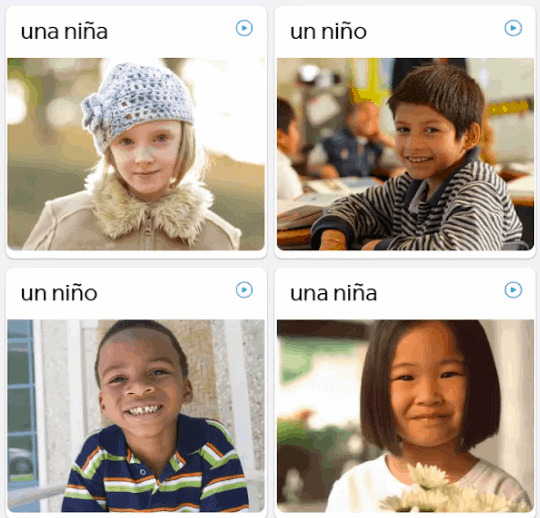
Every set of pictures includes high-quality audio, featuring different speakers. There are also writing exercises which are definitely helpful.
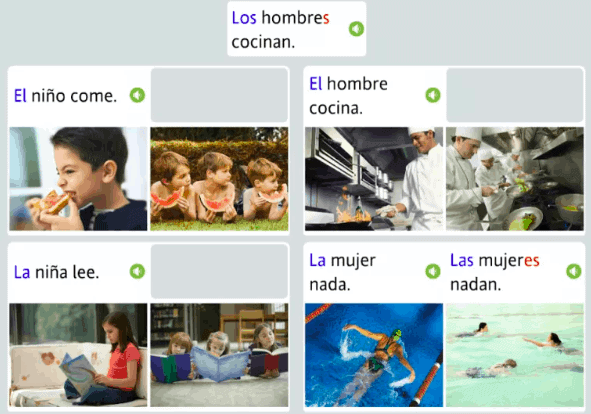
Rosetta Stone also encourages you to practice speaking using voice recognition software. But Rosetta Stone’s voice recognition software isn’t great either. Depending on it alone to gauge your pronunciation wouldn’t be advisable.
One major issue with Rosetta Stone is that the lessons get repetitive. Learners may get bored with the platform and eventually give up on learning a language.
The other big issue is the full immersion approach. Sure, it might encourage you to rely less on performing translations in your head. But, translating in your head as a beginner isn’t a big deal — even if you need to do this when you first start, you’ll eventually get better at automatically recalling words and ideas as you improve.
The short-term gains associated with avoiding translations just aren’t worth giving up the English explanations that would make the language you’re learning much easier to understand.
Read our full review of Rosetta Stone.
How to Use Babbel as Part of a Language Learning Program
If you decide to use Babbel, you may find it helpful to pair it with other resources in order to create a comprehensive language-learning program for yourself. Check out a few tips on the most effective ways to use Babbel:
1. This holds true for any language tool, but the key to success in Babbel is consistency. Try to commit at least twenty or thirty minutes a day to work through the lessons. A little bit of study every day will help you remember new material more effectively than a giant cram session once a week!
2. You also want to make sure you complete the review activities when Babbel provides them. The review will help you build stronger neural connections and permanently remember new material, too.
3. Babbel gives you a solid introduction to basic vocabulary and simple grammar. That said, you will want to enrich your language-learning program with additional conversation outlets and probably a deeper dive into grammar as well.
4. If you plan to learn a language that uses a unique writing system or a non-roman alphabet, you may want to explore apps or hire a tutor to help you master literacy skills. This is especially true for a language like Chinese.
5. No matter what language you plan to learn via Babbel, make your learning process more entertaining by finding movies, TV shows, podcasts, or new outlets in that language. Listening to and watching this kind of media can immerse you in the sounds of your new language.
How to Use Rosetta Stone as Part of a Language Learning Program
In all honesty, Rosetta Stone does not make the best choice for learning most languages.
You may find that it does a good job helping you learn languages that have many similarities to English because you will innately understand the grammar rules of these languages far more easily than you would a totally different grammar system used in a language like Chinese or Japanese.
That said, check out these tips for incorporating Rosetta Stone into your learning program:
1. Commit to pairing Rosetta Stone with other language-learning tools. You will definitely want to find a way to add conversation practice into your weekly study time, for example. You will probably also need a grammar resource to help you understand how to put sentences together in your new language.
You will also want a resource to build your listening comprehension skills. Something as simple as listening to podcasts or watching TV shows in your target language can help develop your ability to quickly translate what you hear.
2. Stick to the order of lessons the program outlines. The lessons do build on each other, and you may find yourself even more lost, with no English translation to guide you, if you jump ahead. Some programs like Ouino allow you to jump around in the lessons and pick whatever looks interesting to you. Rosetta Stone has a traditional linear approach.
3. Like Babbel, each lesson takes less than half an hour to complete. Try to do at least one lesson per day. You may want to keep a log of new vocabulary words learned in each new lesson, too. This way, you can look up translations as necessary and easily review them.
4. You will need additional resources to explain grammar and sentence structure. Concepts like the complex verb tenses in some languages or the unique word order of other languages make more sense when spelled out in black and white. You may want to check out a grammar book specific to the language you want to learn to help with this.
College textbooks often provide clear-cut explanations of the hidden rules of a new language. You can find all the conjugations you need clearly explained here!
5. Rosetta Stone can give you the confidence to quickly recognize an object, situation, or place and almost instantly know the word for it in your new language. This confidence boost can help you keep going as a beginning language learner.
But you probably do not want to stop after completing the 40 or 50 hours of lessons in a Rosetta Stone course. For true fluency, you will need to continue with another learning tool.
Alternatives to Babbel and Rosetta Stone
If you want a language learning program that more comprehensively covers all the bases of your new language, check out these alternatives.
StoryLearning Uncovered series uses an ongoing narrative as the introduction to each chapter of lessons. You experience the story through text audio, and then translation. Then you break down the grammar and cultural points of the story in the following lessons.
This language-learning program offers an engaging approach for people who always want to know what happens next. The online platform currently offers 15 languages, with new options added regularly.
StoryLearning uses professional educators to explain grammar concepts via videos in each chapter. This is a big advantage over a program like Rosetta Stone. However, StoryLearning does not have direct speaking software, so you will not get any pronunciation feedback in this program.
Pimsleur’s app-based language courses offer some of the most comprehensive and thorough language-learning tools out of any program on the market. The program uses a spaced repetition system to help you consistently refresh your memory of the concepts you learn. Each lesson includes pronunciation, grammar, and vocabulary material.
One major upside is that it is a hands-free audio-based approach. You can learn your target language anywhere anytime you find a pocket of time. This heavily audio-based approach could be a downside if you are visual learners. One of the advantages is that you get to practice tons of practical conversations, and can use direct speaking software to get feedback on pronunciation. We like Pimsleur because you can hear yourself speak the target language from Day 1, and that is such a strong motivation booster.
Oiuno focuses on reading, writing, listening, and speaking in some of the most popular languages in the world. It provides a solid core to any language-learning program and uses a uniquely student-driven approach, unlike most other programs/apps out there. For example, you can start vocab learning in areas you are most interested in. That way, you will acquire the target language in a meaningful way to YOU.
The downside to this comprehensive language learning method is that it currently only offers courses in five popular languages (Italian, French, Spanish, German, and Portuguese). Rosetta Stone and Babbel both offer far more languages.
Final thoughts
Although Babbel and Rosetta Stone are among the most well-known language learning resources around, neither one makes the best choice for a prospective language learner.
Out of the two platforms, you should definitely choose Babbel. It’s a bit cheaper but also has a little more variety in lesson exercises. The fact that they also include grammar explanations in English will make your life much easier and remove a lot of doubt.
Still, before committing to either of these courses, consider one of the alternatives listed in this article, such as Storylearning Uncovered, Pimsleur, or Ouino.

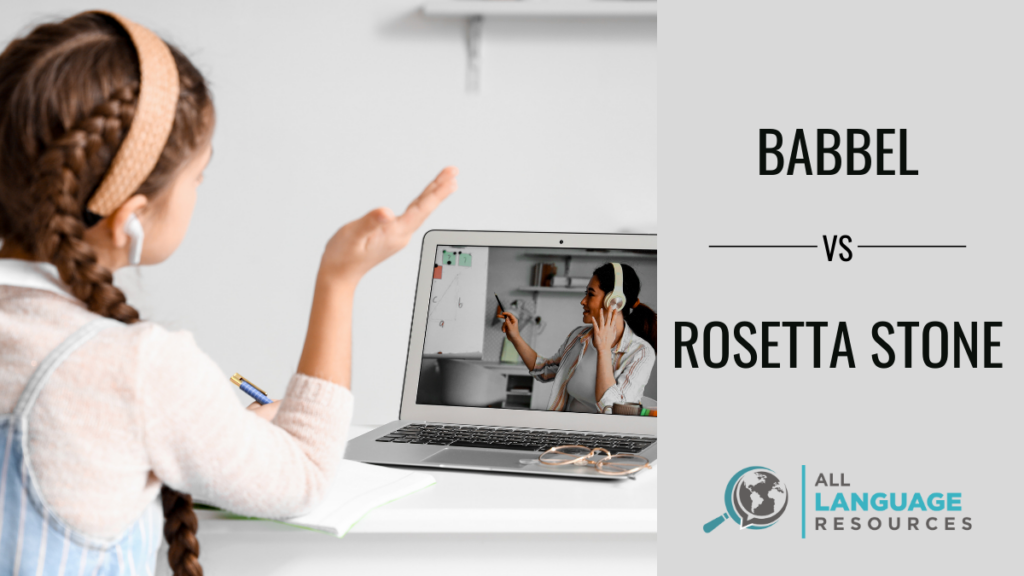
Here’s our post on Turkish courses.
Here’s our guide to learning Tagalog.
Here’s our post on the best apps for learning Spanish. The short answer is, it depends…
So what is the best learning app for Spanish? Thanks!
Hi
I’ll looking for one on Tagalog. Any recommendations?
Hello. Thanks for insight. Could you recommend the best option to study Turkish?
Thanks
Julie
Here’s an article we published about online Hebrew courses.
Unfortunately, there aren’t so many good options for Serbian, but there are still a few. You can find all the resources we’ve reviewed which are available in Serbian here.
Does any application teach Serbian?
Really insightful article. I want to learn to speak modern [not biblical] Hebrew. Help please!
Thank you.
Wendy Widlus